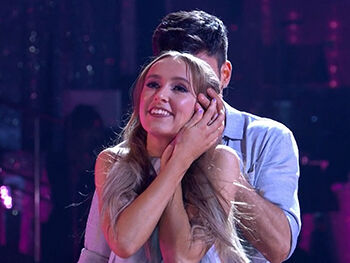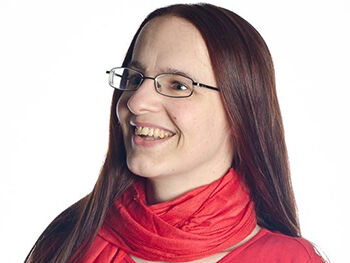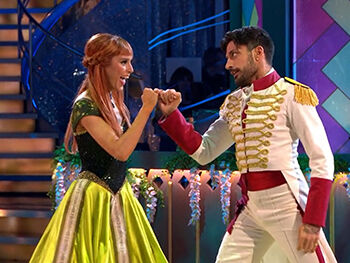Expert comment Last updated 16 December 2021

Ahead of the ‘Strictly Come Dancing’ finale, a disability adviser at Birmingham City University has shared their hopes for better representation of deaf people in the media, why British Sign Language needs more government funding and an insight into their experience of what it’s like to be deaf.
“Rose Ayling-Ellis is an excellent role model for the deaf community and I have enjoyed seeing people across different deaf communities feel represented and understood through her skilful handling of her Strictly fame,” said Natalya Dell, who lives in South Birmingham and has been severely deaf for all of her life.
“Rose uses a range of communication methods including British Sign Language (BSL), hearing aids, lip-reading, gesture and speech and she promotes a modern success story of bilingualism and biculturalism between both the deaf signing and hearing worlds. Her unapologetic pride in her deafness really shows as she works hard to meet hearing people half way and makes them want to do their 50 per cent to meet her half way.”
Actress Rose Ayling-Ellis is the first deaf person to compete in BBC series ‘Strictly Come Dancing’ and is tipped as the favourite to win the competition on Saturday after wowing the show’s judges and viewers.
“I hope that the effects of Rose being on Strictly last in the mainstream community and that people realise deaf people are not scary - we just can’t hear like hearing people,” added Natalya.

“Even if you don’t sign fluently, a bit of patience, common gesture and friendly body language like smiling and acting calmly go a long, long way in us feeling welcome and included in spaces. I hope more people will feel confident enough to do some research into how to include deaf people and ask us what we need to work effectively.”
Rose and her dance partner, Giovanni Pernice, made ‘Strictly Come Dancing’ history this year after they scored 40 in week six, the earliest the top mark has ever been achieved since the series began in 2004.
“There are a number of stereotypes and misconceptions about deaf people, ranging from us not being able to enjoy music, dance or have a good bilingual education, through to us being stupid or ignorant,” said 41 year-old Natalya, who provides support, advice and guidance for disabled students at Birmingham City University.
“Rose smashes all of those stereotypes as she is someone who communicates in both English and British Sign Language (BSL) and can clearly dance and enjoys music. Rose is astute and is handling the media attention very skilfully, sticking to her ethics of not accepting large financial offers to advertise private hearing aids when she believes the NHS provides excellent hearing aid support for most people.
“It is really important to have a bilingual deaf person who is proud of her deafness and sign language in 2021, when some hearing ‘deaf professionals’ are still telling parents of deaf infants that learning sign language isn’t necessary or worse, that it may damage their deaf child’s ability to access English literacy – despite research showing the opposite. If a deaf child does not get enough exposure to any language in their first five or six years of life, this can cause life-long language deprivation problems.
“There is no statutory funding for deaf children, their families or deaf adults to learn sign language – I had to pay for my own sign language classes when I was a 20 year-old university student. Classes became even more expensive in the mid-2000s because they were reclassified as ‘leisure’ and not an essential language.
“When BSL was formally recognised in 2003 by the UK government, only £1 million was allocated for BSL work, - most of which went to non-BSL led charities. Deaf people who need BSL or other communication support like lip speaking or a note taker for medical or other appointments still struggle to access this every day.
“Scotland signed a BSL Act into law in 2015 which required public services to have BSL action plans and ensure information is available in BSL and that deaf people have access to BSL learning opportunities. Scotland’s First Minister always has a BSL and English interpreter on the platform when she makes announcements. In contrast, UK government were sued for not providing BSL and English interpreters for Covid-19 announcements, and in spite of that, still don’t have an interpreter alongside them.
 During the course of this year’s ‘Strictly Come Dancing’ series, contestant Rose took to Twitter to share news of Google searches for learning sign language increasing by 488 per cent.
During the course of this year’s ‘Strictly Come Dancing’ series, contestant Rose took to Twitter to share news of Google searches for learning sign language increasing by 488 per cent.
“Rose’s success on Strictly has shown that people can be interested in a real deaf person achieving great things and I have been really pleased to see people showing an interest in learning BSL,” explained Natalya.
“BSL courses can be great fun. A little BSL goes a long way, as the courses teach people how to communicate visually and expressively using your whole body, face and hands. Many people don’t know that the most important part of sign language is often the face, not the hands, which is how I can still be understood despite having impairments which affect my hands. In the USA, lots of people have a little bit of American Sign Language (ASL), which means deaf people often get better deaf-aware customer service because people have the confidence to communicate accessibly.
“I would strongly recommend anyone wanting to learn BSL to do so at courses taught by a teacher who is a member of the Association of BSL Teachers and Assessors (ABSLTA). ABSLTA teachers will have both strong BSL fluency and appropriate qualifications to teach BSL to students.
“Lots of people mix up Makaton with BSL. Makaton is not the same as BSL, it is a basic communication system which uses completely different signs. There are a lot of people out there selling BSL courses or classes without either the fluency of BSL or teaching credentials to do so accurately.
“There are also a number of hearing influencers on social media claiming to teach people BSL and getting a lot of clicks, attention and sometimes money for it. In reality they tend to talk more than they sign, not bother captioning their content properly and use BSL signs so badly that they can be completely incomprehensible. When these hearing influencers are challenged about their poor sign and appropriation of teaching BSL they can become very aggressive and accuse deaf people of bullying them. They speak and hear, so can convince their large follower groups of largely hearing people that the deaf person is the aggressor and is unfairly excluding them.”
Commenting on the representation of deaf people on screen, Natalya hopes that this improves in the future and that more deaf actors are cast in acting roles.

“Sometimes we see hearing people playing deaf parts and not ‘passing the mic’ to deaf actors who can do them better. This can result in badly filmed sign language, apparent superpowers like a perfect ability to lip-read which just isn’t realistic, and tokenistic inclusion of a deaf character who disappears very quickly. As well as the actors, we need stories about deaf people that are authentic, and preferably written by deaf people.
“In the future I hope we’ll see a range of deaf people in popular media so people realise that no one person can represent a range of overlapping communities and that deaf people are all different.”
The ‘Strictly Come Dancing’ final airs on BBC One on Saturday at 7pm.
Images 1, 3 and 4: Rose-Ayling Ellis and Giovanni Pernice. Credit: BBC
Image 2: Natalya Dell. Credit: Charlotte Barnes